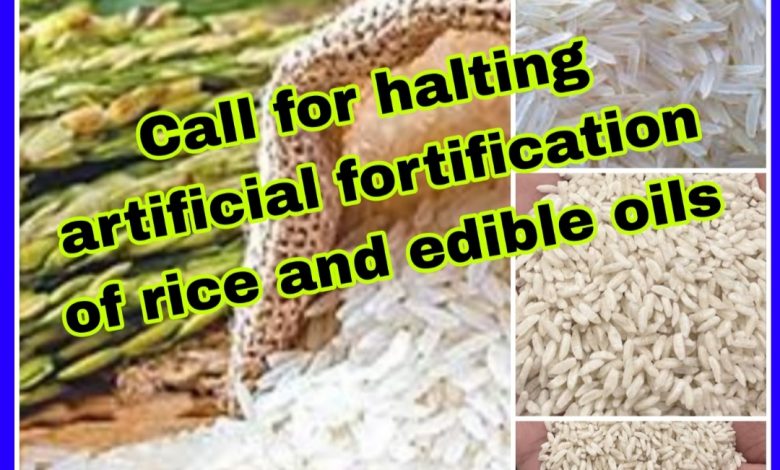Call for halting artificial fortification of rice and edible oils

Suresh Nautiyal
New Delhi: Several Green organisations have demanded that the Government of India immediately stop the artificial fortification of rice and edible oils, and go for sustainable farming practices instead.
In an appeal to the Prime Minister Narendra Modi, the India Greens Party (IGP), the Green Alliance (GA), the Green Forum India (GFI), the Green Action Initiative Alliance (GAIA), the Green Legal Alliance (GLA), the Green Media Alliance (GMA), and the Greens Unite (GU) pointed out that the policy to fortify rice and edible oils was driven by the interests of multinational corporations.
They added that the health experts have already raised serious concerns about the impact of this practice on the health of the Indian poor, particularly those suffering from sickle cell disease, thalassemia, and the risk of vitamin poisonings.
The above-mentioned organisations pointed out that the artificial fortification poses significant dangers, especially for individuals with sickle cell disease and thalassemia. The introduction of excess iron and other nutrients can lead to severe complications, including organ damage and increased health risks.
Fortification is the practice of deliberately increasing the content of an essential micronutrient, i.e. vitamins and minerals (including trace elements) in a food, so as to improve the nutritional quality of the food supply and provide a public health benefit with minimal risk to health.
But the Green organisations are of the view that the fortification initiative has been heavily influenced by lobbying from multinational entities, raising concerns about prioritising profit over public health. This approach neglects the needs of the most vulnerable communities in India.
Their concern is that over-fortification can result in harmful levels of vitamins, particularly affecting children and pregnant women who are already at risk. A focus on artificial additives diverts attention from sustainable nutritional solutions.
Instead of continuing with potentially harmful fortification practices, these organisations have advocated for a comprehensive shift towards sustainable agricultural practices.
“The government should invest in improving the nutritional quality of soils through organic farming practices. Healthy soils yield nutrient-rich crops that can significantly improve public health,” said Mr Prabhath Prabhakaran of the GAIA.
“Reviving traditional farming methods such as polyculture and permaculture will enhance biodiversity, increase resilience against pests, and provide a wider variety of nutritious foods for communities,” Mr Prabhakaran added.
“Based on the recommendations of the Expert Anupam Verma Committee, we call to implement ban on all the 66 toxic pesticides already banned in other countries that threaten both health and the environment in India,” said the India Greens Party’s Co-President, Kailash Anerao, adding that their party believed that true food security and health could not be achieved through artificial fortification driven by corporate interests.
“We urge the Modi government to prioritise sustainable, organic practices that benefit both the environment and the health of the Indian people,” Mr Anerao further added.





